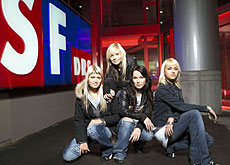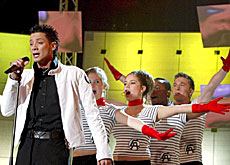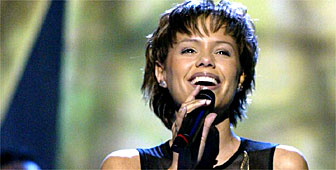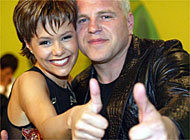Swiss look east for Eurovision success

After a string of humiliating failures at the Eurovision Song Contest, Switzerland has chosen an Estonian girl band to represent it in 2005.
The controversial decision has sent shock waves through the Swiss music scene, where it is being seen as a slap in the face for homegrown talent.
Swiss television bosses say the choice of Baltic rising stars, Vanilla Ninja, is Switzerland’s best hope of success at the televised European music contest.
The Estonian rock chicks – three blondes and a brunette – have topped the charts in Germany as well as at home.
In recent years Switzerland has either failed to qualify for the competition or has ranked in the last six. Since 1998 the country has twice been bottom of the table with “nul points”.
At this year’s Eurovision qualifying event in Istanbul, Switzerland failed to scrape even a single point with its upbeat entry “Celebrate!” sung by former hairdresser and talent contest winner Piero Esteriore.
Bloc vote
It’s hoped Vanilla Ninja can reverse the trend by garnering crucial support from the Baltic and former Soviet states, which have tended to vote for one another and to dominate the rankings.
Head of entertainment at Swiss German television, Toni Wachter, says that if Switzerland wants to remain in the competition it has to follow a different strategy.
“Newcomers were out of the question. We were looking for experienced performers with some chart success,” he said.
But music professionals within Switzerland say that choosing a foreign act to represent the country at the next contest in Kiev, Ukraine, is as good as admitting that the country has no decent performers.
“Scandal”
Heiri Dürst, the head of the federation of Swiss musicians, describes the fact that foreigners are representing Switzerland as “a scandal”.
“There are enough well-established Swiss bands which would jump at the chance, especially if they were paid what Vanilla Ninja are getting,” Dürst told the newspaper “20 Minuten”.
But Wachter told the “Blick” newspaper that many popular Swiss artistes were put off taking part in Eurovision because of the damage to their careers if they received the dreaded “nul points”.
“We need to get a good result again,” Wachter said. “Then better known Swiss bands and singers will have the courage to enter the contest.”
German writer
The fact that the Swiss Eurovision entry was written by a German has also ruffled feathers in the music industry. But Wachter points out that the Ninjas songwriter and producer, David Brandes, has close links to Switzerland.
“Brandes was born in Basel and lives only one kilometre away from the Swiss border,” he told “Blick”.
Vanilla Ninja are not the first foreigners to represent Switzerland at the Eurovision song contest. In 1988 Canadian Céline Dion won the contest for Switzerland, although she was completely unknown in the country.
Dion is one of a handful of singers to have used the Eurovision as a springboard to international fame.
swissinfo with agencies
The Eurovision Song Contest was created in 1956 by the Geneva-based European Broadcasting Union.
Swiss singer Lys Assia won the first contest, held in Lugano, Switzerland.
Switzerland also won in 1988 with a song performed by Canadian Céline Dion.
Switzerland has scored “nul” points on four occasions, most recently in Istanbul in 2004.

In compliance with the JTI standards
More: SWI swissinfo.ch certified by the Journalism Trust Initiative



You can find an overview of ongoing debates with our journalists here. Please join us!
If you want to start a conversation about a topic raised in this article or want to report factual errors, email us at english@swissinfo.ch.